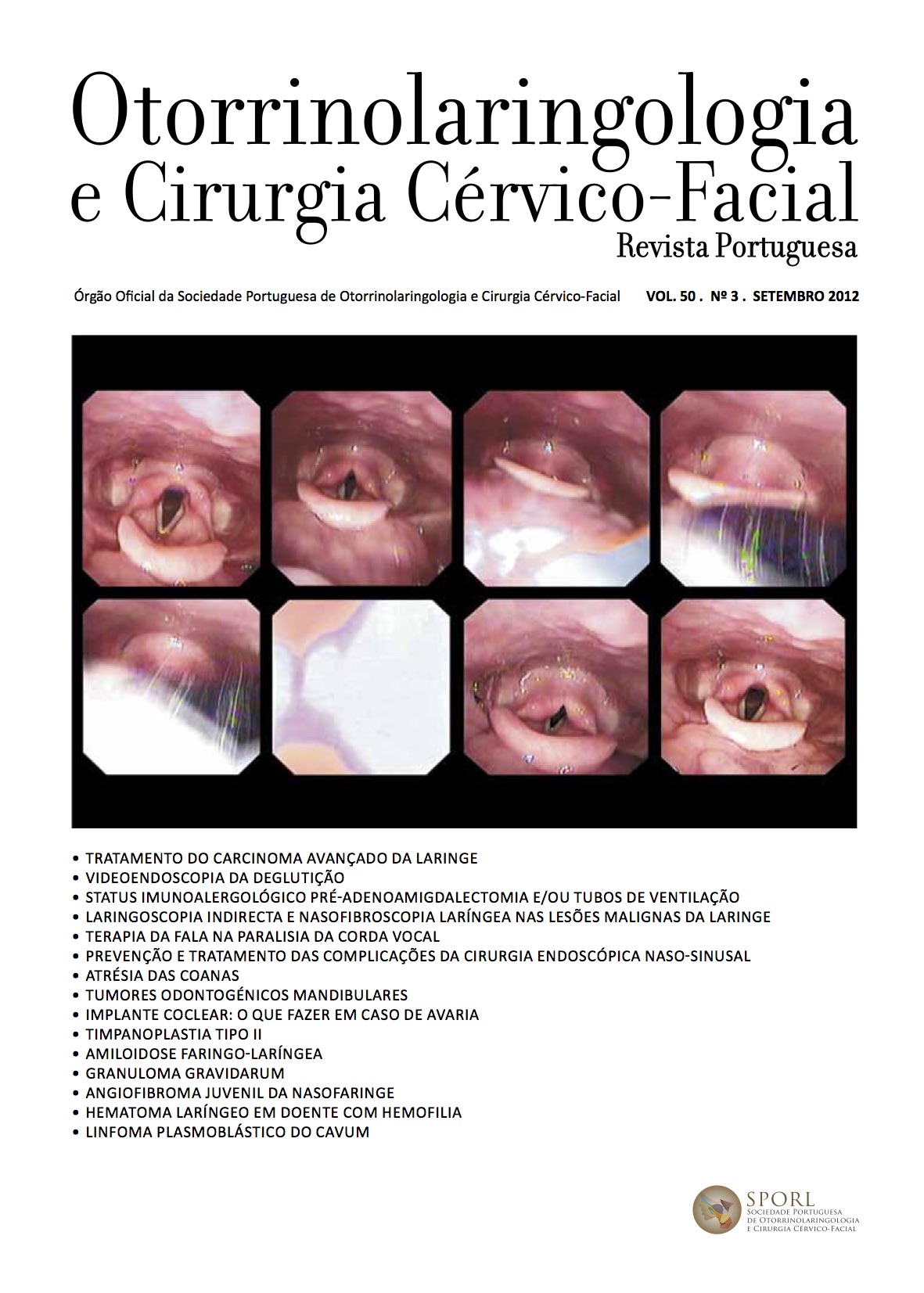Evolution in the treatment of advance laryngeal carcinoma: Are we improving?
DOI:
https://doi.org/10.34631/sporl.111Keywords:
Advanced larynx cancer, treatment, overall survival, disease-free survival, organ preservationAbstract
The options in the treatment of advanced larynx cancer are being reviewed. Recent population studies suggest a decrease in survival in these tumors, in the last two decades. The authors propose to review the progress of the treatment of advanced larynx tumors at Instituto Português de Oncologia do Porto Francisco Gentil-EPE (IPOPFG-EPE) between 1996 and 2007. The study included 205 patients in stage III or IV, divided in two groups (patients treated from 1996 to 1999 and from 2005 to 2007). Between 1996-99, 50% of patients initially underwent surgery, 29% radiotherapy (RT), 1% chemoradiation (Chemo/RT) and 20% induction chemotherapy (Chemo). Between 2005 and 2007, 72% of patients were initially treated with surgery, 7% with RT, 11% with Chemo/RT and 10% with induction Chemo. No significant difference in survival were found between the two periods. According to the initial therapeutic approach, in patients proposed for surgical treatment the Overall Survival (OS) at 2 years was 61,1% and in patients proposed for organ preservation was 57,1%. In patients initially proposed for induction Chemo, the OS at 2 and 5 years was 41,9% and 16%, significantly lower than that of other therapeutic modalities. This review found no difference in survival between the two time intervals studied. The proper selection of T4 for initial surgical treatment probably justify the maintenance of overall survival.
Downloads
References
- Lambert L, Fortin B, Soulières D, Guertin L, et al. Organ preservation with concurrent chemoradiation for advanced laryngeal cancer: are
we succeeding? Int J Radiat Oncol Biol Phys. 2010 Feb 1;76(2):398-402. Epub 2009 Apr 23.
- Wolf GT, Hong WK, Gross Fisher S, Urba Susan, et al. The Induction chemotherapy plus radiation compared with surgery plus radiation
in patients with advanced laryngeal cancer. Department of Veterans Affairs Laryngeal Cancer Study Group.N Engl J Med. 1991 Jun
;324(24):1685-90.
- Forastiere AA, Goepfert H, Maor M, Pajak TF, et al. Concurrent chemotherapy and radiotherapy for organ preservation in advanced
laryngeal cancer. N Engl J Med. 2003 Nov 27;349(22):2091-8.
- Mendenhall WM, Mancuso AA, Hinerman RW, Malyapa RS, et al. Multidisciplinary management of laryngeal carcinoma. Int J Radiat
Oncol Biol Phys. 2007;69(2 Suppl):S12-4. Review.
- Pignon JP, le Maître A, Bourhis J. Meta-Analyses of Chemotherapy in Head and Neck Cancer (MACH-NC): an update. Int J Radiat Oncol
Biol Phys. 2007;69(2 Suppl):S112-4.
- Hoffman HT, Porter K, Karnell LH, Cooper JS, et al. Laryngeal cancer in the United States: changes in demographics, patterns of care, and
survival. Laryngoscope. 2006 Sep;116(9 Pt 2 Suppl 111):1-13.
- Chen AY, Halpern M. Factors predictive of survival in advanced laryngeal cancer. Arch Otolaryngol Head Neck Surg. 2007
Dec;133(12):1270-6.
– Olsen KD. Reexamining the treatment of advanced laryngeal cancer. Head Neck. 2010 Jan;32(1):1-7.
– Wolf GT. Reexamining the treatment of advanced laryngeal cancer: the VA laryngeal cancer study revisited. Head Neck. 2010
Jan;32(1):7-14.
– Gourin CG, Conger BT, Sheils WC, Bilodeau PA, et al. The Effect of Treatment on Survival in Patients with Advanced Laryngeal
Carcinoma. Laryngoscope. 2009 Jul;119(7):1312-7.
– Richard JM, Sancho-Garnier H, Pessey JJ, Luboinski B, et al. Randomized trial of induction chemotherapy in larynx carcinoma.
Oral Oncol. 1998 May;34(3):224-8.
- Worden FP, Moyer J, Lee JS, Wolf GT, et al.Chemoselection as a strategy for organ preservation in patients with T4 laryngeal
squamous cell carcinoma with cartilage invasion. Laryngoscope. 2009 Aug;119(8):1510-7.
- Majem M, Mesia R, Mañós M, Gomez J, et al. Does induction chemotherapy still have a role in larynx preservation strategies? The
experience of Institut Catala d’Oncologia in stage III larynx carcinoma. Laryngoscope. 2006 Sep;116(9):1651-6.
- Posner MR, Norris CM, Wirth LJ, Haddad RI, et al. Sequential therapy for the locally advanced larynx and hypopharynx cancer
subgroup in TAX 324: survival, surgery, and organ preservation. Ann Oncol. 2009 May;20(5):921-7. Epub 2009 Jan 29.
– Major MS, Bumpous JM, Flynn MB, Schill K. Quality of life after treatment for advanced laryngeal and hypopharyngeal cancer.
Laryngoscope. 2001 Aug;111(8):1379-82.
– Hanna E, Sherman A, Cash D, Suen JY, et al.Quality of life for patients following total laryngectomy vs chemoradiation for laryngeal preservation. Arch Otolaryngol Head Neck Surg. 2004 Jul;130(7):875-9.
- Weber RS, Berkey BA, Forastiere A, Ensley J, et al. Outcome of salvage total laryngectomy following organ preservation therapy:
the Radiation Therapy Oncology Group trial 91-11. Arch Otolaryngol Head Neck Surg. 2003 Jan;129(1):44-9.
– Grau C, Johansen LV, Hansen HS, Overgaard J, et al. Salvage laryngectomy and pharyngocutaneous fistulae after primary
radiotherapy for head and neck cancer: a national survey from DAHANCA. Head Neck. 2003 Sep;25(9):711-6.
– Paydarfar JA, Birkmeyer NJ. Complications in head and neck surgery: a meta-analysis of postlaryngectomy pharyngocutaneous
fistula. Arch Otolaryngol Head Neck Surg. 2006 Jan;132(1):67-72.
– DeSanto LW. T3 glottic cancer: options and consequences of the options. Laryngoscope. 1984 Oct;94(10):1311-5.






